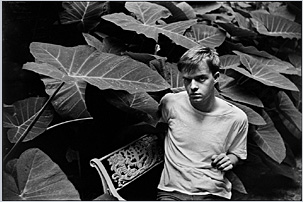Biography
Truman Capote was born in New Orleans on September 30th, 1924. At age six, he was sent to live with his two aunts in Monroeville, Alabama. Although Capote’s family was not unkind, their interests were much different from his; he felt that they “definitely thought there was something wrong with [him]” (Steinem 95). Capote’s mother’s family in Monroeville was very traditional, and full of pride; this made it difficult for them to deal with Truman’s sexuality and his “bizarre life-style” (Moates 16). He once brought home a boyfriend, only to have his father laugh and his mother curse and run him out of the house (Moates 227-28). Capote moved to New York City to live with his mother and step father, Joseph Capote, at age ten. For the most part, Capote’s childhood was insecure, as he was quite isolated. He did not have many friends his own age and felt that his parents--mom, dad, and step dad--all failed him (Robinson7). Many of these disappointments with his relatives were later “immortalize[ed] in his writing” (Dukes 141). It seems that even much later in life, Capote could not escape the difficulties of his childhood, as they became embedded in many of his troubled, fictional characters, such as his aunts in "A Christmas Memory," and himself as Joel, in Other Voices, Other Rooms.
Writing remained Capote's “private obsession” (Steinem 96) until high school, when his family moved to Greenwich, Connecticut. His teacher, Miss Wood, was the only one who ever really inspired and encouraged him to write. In his adolescence classmates no longer teased him, despite his “queer dress;” for the most part, his peers respected him, even though they didn’t understand him (Robinson 11). Capote reflects on this stating, “from the moment I felt secure in my talent, I didn’t mind being a loner, anyway. As long as that wasn’t a fantasy, I knew everything was going to be all right” (Steinem 104). Capote was most certainly “secure in his talent;” he began publishing short stories in magazines at age seventeen (Robinson 14), the beginning of many, many years of successful works.
|
|

|
Capote’s early and middle adulthood (1940s-1960s) represented an era of his most prominent and influential writings, including short stories, novels, plays, and screenplays. He won a number of awards, including the O Henry Memorial Award in 1946, and the creative writing award from the National Institute of Arts and Letters in 1959 (“Capote Truman” 445). He was most famous at this point in his life, though some argue that his name and face were more well-known than his actual work (Garson 65). For a man of only 5ft. 3in., he exhibited great confidence, making everyone else around him feel too tall (Steinem 87). His radiant and flamboyant personality left quite an impression on the society around him.
|
|
In his later adulthood (1970s and into the 80s), Capote appeared on many talk shows and interviews. He mostly traveled, read, and wrote in his journal, searching for material to write, but did not produce much in the later years of his life, becomming somewhat of a “social pariah” by 1977 (“Capote, Truman” 445). This period was marked as Capote’s decline as an important public figure. He fell into bad drinking and drug habits. Capote died “in a state he hated, without any family around” (Moates 229). He had told many people that he had “used up the world” (Garson 81). Just a month before his 60th birthday, on August 24th, 1984, Capote passed away as a result of both drug intoxication and liver disease (“Capote, Truman” 445). |
|
|
|


